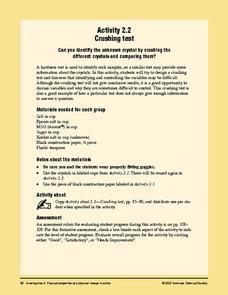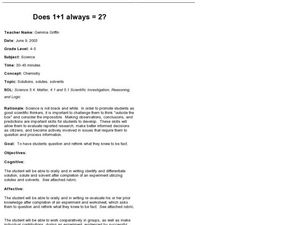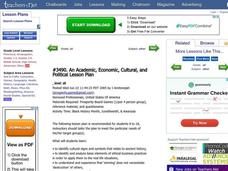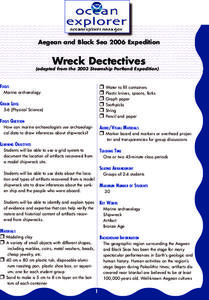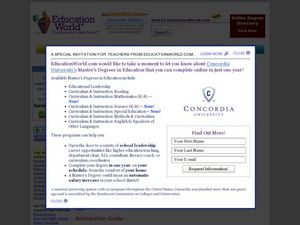American Chemical Society
Crushing Test
Solidify understanding of the properties of crystals by crushing them to compare hardness. After some class discussion, a procedure is planned, and then small groups go about making observations as they crush five different crystal...
Curated OER
Does 1 + 1 always = 2
What a great way to explore the scientific process! Learners conduct an experiment in which they use sugar and water to illustrate the concept of solutes and solvents. With this hands on approach, they are bound to remember what they...
Curated OER
High and low notes!
Little ones talk about how sounds can be made high or low depending on the length of the keys that make them. They label eight xylophone keys from highest to lowest depending on the relative sound they'd make. Tip: Get out a real...
Curated OER
Life Comes in Cycles
Kids are fascinated by chickens and their eggs. Here is a learning exercise has young learners take a look at the four stages in a chicken's life cycle. They have four cycles to organize: egg, chick, young bird, and adult. They have to...
Curated OER
The good microbes
The question posed for the class to consider; What would decay and what would not? They read the short passage on decomposition and microbes, then mark the items that would decay after a two-week period. A scientific investigation idea...
Curated OER
An Academic, Economic, Cultural, and Political Lesson Plan
Students reflect on how many board games they've played have African Americans, their culture or history incorporated within. They identify four street games and three card games that appeal to African Americans. They play the...
Curated OER
Horse Sense
Students research wild horses in the American West. They brainstorm how they can help preserve the wild horses.
Curated OER
Acid Mine Drainage
Students use cabbage, backing soda, cobblestones, and more to test the acid in the water. In this acid mine damage lesson plan, students complete 13 experiments to test and treat acid.
Curated OER
Wreck Detectives
Junior archaeologists examine types of artifacts from the Bronze Age on the internet. In collaborative groups, they create a story about a ship from this period and then construct a model of the ocean floor after their ship has sunk....
Curated OER
"Logs of Straw: Dendrochronology"
Young scholars act as dendrochonologists working to reconstruct a 50 year climatic history. They make a personal timeline.
Random House
Focus On: Censorship & Banned Books
Billy Collins' "Rain" introduces the Random House 104-page magazine for educators that focuses on censorship and banned books. The resource is packed with teaching guides, articles by noted authors, and links to organizations against...
Curated OER
Don't Marry the Mole!
Third graders examine the power of solar energy. In groups, they create their own pizza box solar oven to discover the power of the sun and how it is a source for heat and light. To end the lesson, they use the internet to examine...
Curated OER
Think Green
Students experience and practice compositing and recycling through hands-on-activities. They distinguish between which items from their trash can be recycled, composted and reused. The process for making recycled paper is also covered in...
Curated OER
Hurricane Predictions
In this hurricane worksheet, students analyze and interpret a hurricane graph. They complete 5 short answer questions that follow.
Curated OER
New Year Celebrations Around the World
Young scholars share their New Year's traditions, then read a news article about how people around the world celebrate the start of a new year. In this current events lesson, the teacher introduces the article with a discussion and...
Curated OER
Food Safety
Learners recognize that safe food preparation is important to good health. In this food safety lesson, students participate in an activity learners separate, clean, chill, and cook food safely. Students use Glo Germ to find where germs...
Curated OER
Do Different Colors Absorb Heat Better?
Students work together to test how the color of a material affects how much heat it absorbs. They make predictions and take notes on their observations. They discover how engineers use this type of information.
Curated OER
Pump It Up
Students use water in a flask to simulate how oil is pumped or forced out of the Earth by pressure from natural gas or human machinery. In this oil lesson plan, students complete a lab packet and work in groups.
Curated OER
What do Lenses Do?
Students learn to differentiate between different types of lenses. In this lens lesson, students discover how lenses are different and why a specific lens should be used. Students understand how to find the focal point of a lens....
Curated OER
Microorganisms: Good Guys or Bad Guys?
Students discover the role microorganisms play in our lives. In this decomposition lesson, students examine decaying foods and plants in order to analyze the different bacteria that grows. Students discuss the good and bad of...
Curated OER
Reflecting on Reflectivity
Students plan and construct a "mini-lab" to measure the reflectivity of different earth surfaces. They measure reflectivity of materials, including ice, soil, rocks, etc., and then extrapolate from what they have learned to consider the...
Curated OER
Physical Properties of Matter
Students examine the physical properties of matter. They identify and classify a variety of objects based on their physical properties.
Curated OER
Can You See the Light?
Students investigate the transmission of light energy. In this light energy lesson, students observe bubbles using different colored filters and record their observations. They also look at a light source through various materials and...


